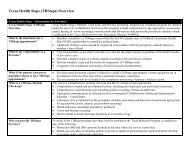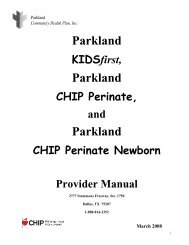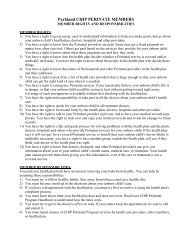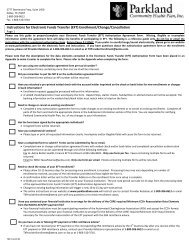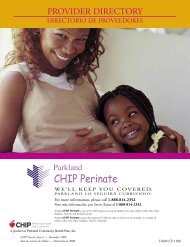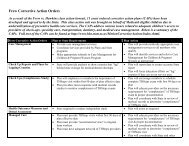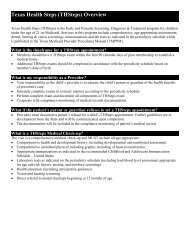Speech Therapy Policy - Parkland Community Health Plan, Inc.
Speech Therapy Policy - Parkland Community Health Plan, Inc.
Speech Therapy Policy - Parkland Community Health Plan, Inc.
You also want an ePaper? Increase the reach of your titles
YUMPU automatically turns print PDFs into web optimized ePapers that Google loves.
Requests for treatment of disfluency must be accompanied by a standardized evaluation such<br />
as the Stuttering Severity Instrument for Children and Adults (SSI) and a description of<br />
concomitant features. Disfluency is a common condition in young children with onset after age<br />
3 and is usually self-correcting by age six to seven. This is sometimes referred to as normal nonfluency<br />
and is not an indication for speech therapy.<br />
The number of therapy visits authorized will be based on the severity and type of condition.<br />
Frequency of therapy is expected to be 1-2 times per week up to a maximum of 3 times per<br />
week for severe problems. There is no evidence that therapy more often than 3 times per week<br />
improves outcomes.<br />
Initial therapy will not be approved when:<br />
1. The test results are in the normal range.<br />
2. The language delay is the result of English being a second language.<br />
3. The proposed therapy is considered to be experimental and investigational.<br />
4. The proposed therapy is solely educational such as grammar, vocabulary or other<br />
subjects which are part of a school curriculum.<br />
A re-evaluation is required every 6 months for continuation of therapy unless the medical<br />
director requests it more frequently. The same standardized tests must be utilized for reevaluation<br />
as were used to evaluate the member initially unless these are no longer<br />
appropriate for the member’s age.<br />
A request for continuation of therapy must include the following documentation:<br />
• A referral and authorization form, including a current, handwritten prescription and/or<br />
treatment plan with the original physician’s signature and date<br />
• Documentation of progress made from the beginning of the previous treatment period<br />
to the current service request date, including progress towards previous goals and the<br />
number of treatments used to date from the previously authorized visits.<br />
• Documentation of the parent/member’s attendance and participation in the therapy<br />
sessions.<br />
• Documentation of the provision of a home exercise program and the parent/member’s<br />
performance of that program.<br />
• Assessment of the member’s capability for continued measurable progress<br />
• A proposed treatment plan for the requested extension dates with specific goals related<br />
to the client’s individual needs.<br />
Results of patient-specific measures should demonstrate that the individual is consistently<br />
improving and that a plateau (i.e., where no additional meaningful improvements are being<br />
measured or are expected to occur) has not been reached.<br />
Continued therapy is no longer medically necessary and will not be approved when:<br />
1. Test scores have improved to within 1.33 SD from the mean; or<br />
09/2012<br />
Page 2



